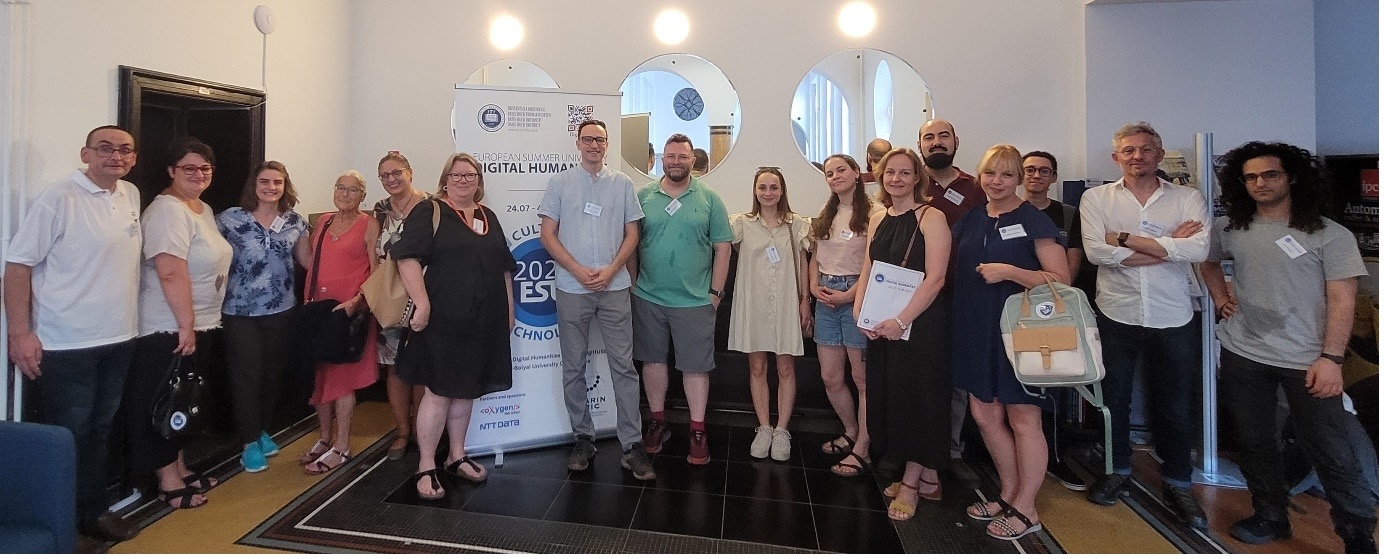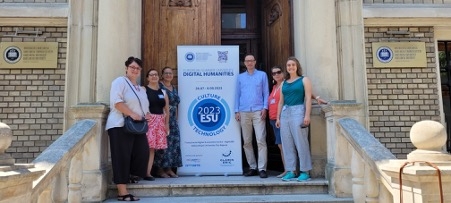From 24 July to 4 August 2023, the historic city of Cluj-Napoca, Romania, became a vibrant hub of intellectual exchange and innovation. The Transylvania Digital Humanities Centre (DigiHUBB) at Babeș-Bolyai University had the honour of hosting the 13th edition of the European Summer University in Digital Humanities ‘Culture & Technology’. This marked the first time that the event was held at BBU, under the leadership of Dr. Christian Schuster, director of DigiHUBB.

The European Summer University (ESU) has been a beacon of success since its inception in 2009 at Leipzig University, thanks to the tireless efforts of Professor Elisabeth Burr and her team. It was a fitting tribute that she inaugurated the first ESU at its new location with an inspiring opening lecture.
As always, the ESU was a dynamic summer school that offered a rich array of workshops, lectures (both on-site and online), project presentations, round table discussions, and social and cultural activities. Over the course of 11 days, 42 participants - including instructors, lecturers, researchers, and scholars from 13 different countries across four continents - gathered to share their latest ideas, findings, and methods in the expansive field of Digital Humanities. The event was generously supported by CLARIN ERIC through a User Involvement Funding grant, with local sponsorship from Syncro Soft (creators of Oxygen XML Editor) and NTT Data.
The Summer University welcomed participants from all over Europe and beyond. It fostered an interdisciplinary exchange of knowledge and experience among students, young scholars, academics from the arts and humanities, library sciences, social sciences, as well as engineering and computer sciences. This diverse gathering created a multilingual and multicultural context that laid the groundwork for future project-based collaborations.
What sets the European Summer University apart is its commitment to integrating linguistics with Digital Humanities. It not only offers a platform for discussing and acquiring new knowledge in computer technologies central to humanities computing, but also delves into the implications of applying computational methods to cultural artifacts. Furthermore, it consciously addresses the gender divide - the under-representation of women in Information and Communication Technologies (ICT) in Europe and many parts of the world - by leveraging the challenges posed by humanities for computer science and engineering.
This year’s participants had the opportunity to attend one or two of four workshops:
- Carol Chiodo (Harvard University Library): ‘Practical Applications to Data and the Humanities: Creation, Discovery and Analysis’
- David Joseph Wrisley (NYU Abu Dhabi): ‘Humanities Data and Mapping Environments’
- Simone Rebora (University of Mainz), Giovanni Pietro Vitali (University of Versailles Saint-Quentin-en-Yvelines): ‘Distant Reading in R. Analyse the text & visualize the Data’
- Kristina Pahor De Maiti (Institute of Contemporary History, Ljubljana / CLARIN), Anna Kryvenko (Institute of Contemporary History, Ljubljana / CLARIN): ‘Combining Corpus Linguistics and Discourse Analysis to Explore Parliamentary Debates across Europe’.
The lectures delivered by esteemed speakers such as Moises Rockembach (Universidade Federal do Rio Grande do Sul, Brazil/international advanced research fellow at DigiHUBB), Alejandro Bia Platas (Miguel Hernández University, Elche), Alina Andreica (Babeș-Bolyai University, Cluj-Napoca), Yael Netzer (Hebrew University, Jerusalem), as well as Christian Schuster (Director of DigiHUBB at Babeș-Bolyai University, Cluj-Napoca), provided a platform for participants to engage in stimulating discussions on a wide array of topics in Digital Humanities. These ranged from computational methods and digital tools to AI and website optimisation. The summer school was further enriched by the presentations of numerous participants and invited researchers who shared their research projects, results, experiences, and queries.

However, the main achievement of ESU-DH C&T 2023 was undoubtedly the community it fostered. After years of uncertainty due to pandemic conditions and online-only events, the digital humanities community that had formed around the ESU over the years had the opportunity to meet in person once again. This gathering allowed for the exchange of experiences and ideas, the forging of new cooperation plans, and the introduction of the spirit of ESU to a new location.
Despite being announced relatively late in April 2023, the organising team overcame numerous challenges associated with relocating and rebranding ESU, building up the entire organisational infrastructure in a new institution, reaching out to potential participants and securing financial and logistic support from partners at short notice.
The organising team was a diverse group of specialists from various areas of humanities and social sciences. This diversity was mirrored by the participants' interests and backgrounds, reaffirming that conventional boundaries between disciplines are not obstacles but opportunities for advancing knowledge in Digital Humanities.
Looking ahead, the 14th European Summer University in Digital Humanities ‘Culture & Technology’, which will take place from 15 to 26 July 2024 at the same location, promises to be an even more significant event. It aims to offer a much broader spectrum of workshops, lectures, poster sessions, and project presentations, while bringing together more participants and partners, such as CLARIN, DARIAH and others. For more details about this exciting event, please visit the ESU website at https://esu-ct.conference.ubbcluj.ro and follow it on social media.